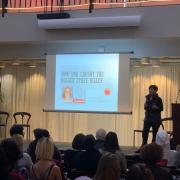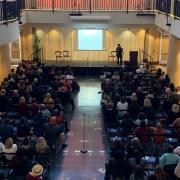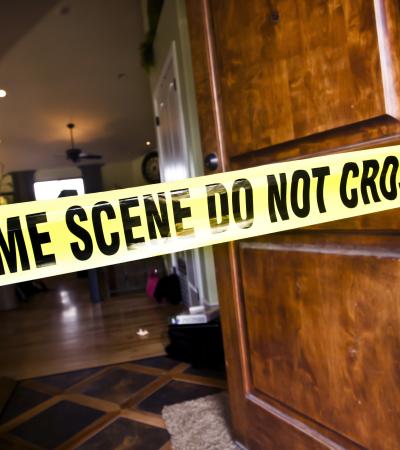From books to documentaries to podcasts and beyond, true crime is experiencing a renaissance in America.
This four-hour event included a presentation from a local forensic DNA expert, a panel of local true crime authors, a true crime trivia challenge and a presentation by a social historian and crime expert.
Advanced Planning
Planning began five months in advance. We started by sending speaker requests, covering a wide range of expertise and potential topics.
In the end, we had an opening and closing speaker, with a panel of local authors and a true crime trivia challenge in between. We actually had to hold one speaker for next year due to time constraints, and have even been contacted by a local group that is interested in being involved next year, as well.
Our Friends of the Library granted us $350 to cover various anticipated expenses. As materials for display began arriving, I evaluated them for condition and built the collection for display at the event. (Please see attachment at the right for more details!)
The biggest challenge was preparing for attendance. Not knowing how many people might come, we advertised that pre-registered attendees would be given priority seating.
We met the maximum limit of 300, but the day of the event we had approximately 200 in attendance, with 150 of those being people who had registered. My belief is that, knowing registration was full, most of the people who might have come did not.
Marketing
Promotion for this event on our website and in-house began in late September/early October. We also reached out to local press contacts according to their preferred timelines.
We also promoted on various local websites’ event calendars, and the event was featured by a local news station and in two local publications with wide readership.
Budgeting
Our Friends of the Library group granted us $350 to cover expenses. We spent $75 on prizes given to the winner of the trivia challenge (in addition to prize books donated by the authors) and $75 on snacks and coffee for the presenters and their guests.
We gave $200 as an honorarium for one of the speakers (the only presenter who was not local). To make this less expensive (or no cost at all), this could all be eliminated. The honorarium was optional, as that speaker did not request payment.
The money spent on prizes could instead have been replaced by donated materials. The food and coffee for presenters were likewise optional.
Day-of-event Activity
We have the good fortune of having access to a large event hall that is staffed separately. Their staff set up the spaces we used (chairs and tables, speakers, microphones, etc.). The set-up handled by event staff included two materials displays (books, DVDs, audiobooks) and the check-in area, plus putting out the food and drinks (and picking up coffee that morning).
In addition to the staff that work for the event hall, four staff members coordinated everything the day of, as well as the staff member who presented the trivia challenge.
Program Execution
Audience members began arriving as much as an hour before the event began, with most arriving in the 30 minutes prior to starting. The schedule (see attachments) was easily followed on time.
The biggest change we will make next time is scheduling restroom breaks. The expectation was that people would come and go at will, as there were adequate, easily-accessible restrooms, but the feedback we received with the most frequency was wishing there had been a scheduled break.
Overall, the event was very well received and we are already making notes for next year!
Advice
We collected email address at the time of registration, which allowed us to send a SurveyMonkey follow-up survey. The questions we asked, as well as the overall feedback we received, are included in the attachment.
Cast a wide net — even in a smaller area, you might be surprised what interests and expertise you’ll find among your community members. Consider creating a list of potential speakers before you accept anyone (unless it is a must-have speaker). Give yourself time to see who could be part of your program and if you have the option to be selective!
Know in advance what space(s) you will have access to and how much time you will have, as this will help you determine how many speakers you can host, whether you will need to have everything happen in one room, or if you can have breakout sessions in multiple spaces.
Include a warning note in your publicity (for example, "Material in some presentations may be too graphic for younger or more sensitive participants").
Supporting Materials
- Feedback (Coming Soon!)
- Programming Librarian Facebook Group






